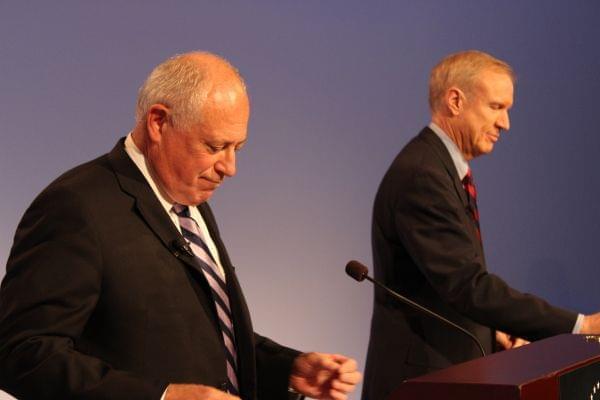Troubled Anti-Violence Program Used As Political Fuel During Debate

Gov. Pat Quinn and Republican challenger Bruce Rauner gather themselves before their debate in Peoria Thursday night. Hannah Meisel/WILL
Four hours before Governor Pat Quinn and Republican Bruce Rauner debated in Peoria, a two-day long hearing on Governor Pat Quinn's troubled anti-violence program wrapped up in Chicago. The governor brushed off results of the hearing as nothing more than "political."
The NRI was supposed to provide job opportunities for young people in rough neighborhoods in Chicago, as a deterrent to violence. But the program was mismanaged, according to a scathing report from the state's auditor general earlier this year.
Ahead of the NRI hearing, Quinn's former chief of staff, Jack Lavin, gave up emails revealing coordination between himself and Quinn's campaign on the timing of the program's implementation.
This affirmed Republican lawmakers' suspicion of the program's timing, announced a month before Quinn won the 2010 election.
But Quinn says the whole hearing had ulterior motives.
"It sounded very political, certainly from the Republican side," Quinn said to reporters after the debate Thursday night.
Quinn downplayed the coordination between Lavin and his campaign.
"Well, I think it's very clear that all the rules were followed," he said. "If you're working for state government, outside of government on your own time, you have the right, under the First Amendment, to participate in political campaigns."
But Quinn's challenger Rauner says the hearings point to "big trouble" for Quinn.
Rauner and other Republicans have used the mishandled program throughout the campaign to knock Quinn down a few pegs.
When asked during Thursday's debate how the Quinn's NRI program is different than Rauner's investments in credit unions on the South Side of Chicago, the candidate laughed off the suggestion he's using his wealth to get African American votes.
"The difference is I'm using my personal money," Rauner said. "Pat Quinn has been trying to buy the election using taxpayer money, both in his NRI program and his various other programs he's been running around the state, using taxpayer money, dropping into certain communities to try to get voters influenced."

